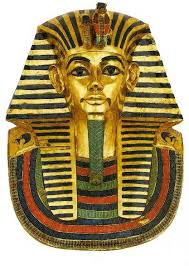
LINK
So it turns out that The Chairman of the Fukn Board isn’t the only one to like red wine. Not that I ever actually thought that. God knows I’ve drank enough great red wine in the past years with enough cool people to know that. For some reason though I am sort of proud to find out that old Funky Tut himself was a fan of the Red.
If I could choose, just one booze, it would be red wine.
Apparently, the Egyptians felt the same.
-
LONDON – King Tutankhamen drank red wine, says a researcher who analyzed very dry traces of the vintage found in his tomb. Maria Rosa Guasch-Jane, who briefed reporters Wednesday at the British Museum, said she had invented a process which gave archaeologists a tool to discover the color of ancient wine.
Guasch-Jane also discovered that the most valued drink in ancient Egypt, shedeh, was made of red grapes.
Apparently, the Egyptians were quite the oenophiles too.
-
Wine bottles from King Tutankhamun’s time were labeled with the name of the product, the year of harvest, the source and the vine grower, Guasch-Jane said, but did not include the color of the wine.
Several clues had led scientists to believe that the wine may have been red: drawings from the time of grapes being pressed into wine were red and purple, for example. But the color of King Tut’s wine was impossible to verify until Guasch-Jane invented a process to detect a color compound not found in white wine called syringic acid.
To test her method, Guasch-Jane scraped residue from wine jars owned by the British Museum and the Egyptian Museum in Cairo. Two of the jars came from King Tut’s tomb, discovered by English archaeologist Howard Carter in 1922.
Winemaking dates to 5400 B.C., according to American molecular archaeologist Patrick McGovern, who discovered the earliest known traces of grape residue in northern
Iran in 1994.
Grapevines are not native to Egypt, McGovern explained at Wednesday’s presentation. Scientists believe the first wine discovered in Egypt, buried in King Scorpion’s tomb in about 3125 B.C., was produced in Jordan and transported 500 miles (800 kilometers) by donkey and boat to Egypt, he said. Eventually, grapevines were planted in Egypt.
Research shows that ancient Egyptian kings and members of the upper class drank wine regularly, but common people consumed it only during festivals and special occasions, Guasch-Jane said. Wine was offered to gods in ceremonies, and kings were buried with jars of wine and food similar to what they consumed when they were alive, she said.
Guasch-Jane first reported her findings in the academic journal Analytical Chemistry last year.
